|
|
|
Sort Order |
|
|
|
Items / Page
|
|
|
|
|
|
|
| Srl | Item |
| 1 |
ID:
138875
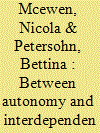

|
|
|
|
|
| Summary/Abstract |
Drawing on the distinction between self-rule and shared rule in multilevel states, this article argues that shared rule has been the neglected element of the UK devolution settlement. The ability of the devolved administrations to participate in, and influence, national decision making through shared rule mechanisms is very limited. The article argues that the lack of shared rule is especially problematic in light of the increasing complexity of the Scottish devolution settlement in the wake of the Scotland Act 2012 and the Smith commission report. Smith, in particular, seems set to increase both the power of the Scottish Parliament and its dependence on UK policy decisions in the areas of tax, welfare and the economy. Creating a more robust intergovernmental system which could manage these new interdependencies will be a significant challenge, and yet, without such a system, the new settlement will be difficult to sustain.
|
|
|
|
|
|
|
|
|
|
|
|
|
|
|
|
| 2 |
ID:
138885
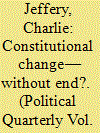

|
|
|
|
|
| Summary/Abstract |
The outcome of the Scottish independence referendum in September 2014 confirmed Scotland's continuing membership of the UK—at least for the time being. It did not take long for some who had campaigned for Scottish independence to begin envisaging a second referendum. Indeed, in early 2015 all the political momentum in Scotland appeared to be with the pro-independence Scottish National Party, which had more than tripled its membership to close to 100,000 since the referendum and had managed a smooth transition from Alex Salmond's leadership to that of Nicola Sturgeon, the new Scottish First Minister. Its main rival in Scotland, the Labour party, found itself in a rather different succession debate, sparked by Johann Lamont's resignation statement complaining about the lack of autonomy given by the party at Westminster to the party in Scotland.
|
|
|
|
|
|
|
|
|
|
|
|
|
|
|
|
| 3 |
ID:
138876
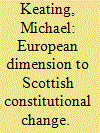

|
|
|
|
|
| Summary/Abstract |
Scottish self-government and European integration are linked. Europe has become an important framework for the independence project. Evidence for Scots being more pro-European is ambivalent, but there is a pro-European consensus in Scottish political parties and civil society. In the referendum campaign, the No side suggested that an independent Scotland might not gain admission to the European Union. If the United Kingdom as a whole should vote to withdraw from the EU in a future referendum but Scotland to stay in, the independence question would re-emerge. In the absence of independence, a number of issues arise as to how Scottish interests can best be represented in the EU.
|
|
|
|
|
|
|
|
|
|
|
|
|
|
|
|
| 4 |
ID:
138880
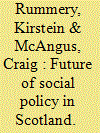

|
|
|
|
|
| Summary/Abstract |
Scotland has laid claim to being ‘different’ from the rest of the UK with regards to disability policy. This article examines the evidence for that with regard to long-term and social care, and discusses the possibilities opened up by the devolution of disability benefits. It asks whether Scotland will demonstrate policy divergence from the rest of the UK, and whether that is likely to be beneficial for disabled people. It argues that Scotland has the potential to create better social policies for disabled people, but faces significant challenges in doing so.
|
|
|
|
|
|
|
|
|
|
|
|
|
|
|
|
| 5 |
ID:
138889
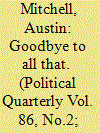

|
|
|
|
|
| Summary/Abstract |
This article is the retirement reflections of an MP of thirty-eight year's standing. The story is mainly one of the decline of the Commons, a decline in the number of ‘big beasts’ and in the calibre of members and the quality of debates to the level of five-minute harangues and the custard pie-throwing of Prime Minister's Question Time. The House has lost its functions of staging the national debate and checking the executive to the media but has gained a new role as a national audit of government's performance and policies through the select committee system. MPs are working harder. Fewer now have outside jobs. They are more focused on their constituencies and though they have fewer powers there, and nationally more and better staff, they also have less respect and less influence. Personally, the end of what has been a long-fighting national retreat from social democracy has been a rear-guard action against the emergence of a colder, harder, neoliberal world. Retirement means relegation to watching that from the sidelines, not ringside.
|
|
|
|
|
|
|
|
|
|
|
|
|
|
|
|
| 6 |
ID:
138881


|
|
|
|
|
| Summary/Abstract |
During the course of the referendum campaign, the Scottish government argued that free tuition for Scottish and EU students symbolised Scotland's preference for universal services and was intrinsically fairer than the ‘marketised’ systems operating in the rest of the UK. Invoking principles of both social justice and pragmatism, three distinct critiques of the Scottish government's higher education policy were mounted and adopted by different policy actors for different political purposes. Following a discussion of these arguments, this article concludes that a more nuanced discussion of higher education policy in Scotland is required, focusing not just on the absence of tuition fees but also on the distribution of debt and allocation of funds across the entire education system. We also note that the focus on tuition fees policy suggests that higher education systems across the UK are set on a process of divergence, whereas there are strong pressures towards policy convergence in areas such as research policy and internationalisation.
|
|
|
|
|
|
|
|
|
|
|
|
|
|
|
|
| 7 |
ID:
138883
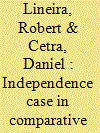

|
|
|
|
|
| Summary/Abstract |
Scotland is not the only sub-state unit in Europe where relevant political actors make claims for independence. To generate insights on these independence demands, we compare the drivers, arguments and popular support for secession in Scotland, the Basque Country, Catalonia and Flanders. We argue that national identity, party politics and the economy are behind the independence requests, and the exact articulation of these elements varies from case to case. Currently, the most salient of these demands are the ones from Catalonia; Basque demands for self-determination are less prominent than in the past, whereas the demand for a vote on independence is much less articulated in Flanders. Although the Scottish independence referendum has set a precedent for solving independence disputes, we argue that the possibilities of exporting the Scottish referendum experience to other realities are limited.
|
|
|
|
|
|
|
|
|
|
|
|
|
|
|
|
| 8 |
ID:
138890
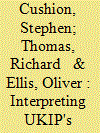

|
|
|
|
|
| Summary/Abstract |
UK broadcasters came under fire for the amount of airtime UKIP and its leader Nigel Farage received after the party won the most votes in the 2014 EU election. Our content analysis of television news during the 2009 and 2014 campaigns found little bias in terms of soundbites, but in the more recent election Farage visually appeared in coverage to a greater degree than other party leaders. Moreover, two core UKIP policies—being in or out of Europe and immigration—dominated coverage in 2014. We suggest the ‘UKIP factor’ and the media's fascination with Nigel Farage help explain why the 2014 campaign was more visible on television news than was the case in 2009 and was largely reported through a Westminster prism. Although television news bulletins attempt to impartially report elections, the 2014 campaign agenda was largely contested on UKIP's ideological terrain and the party's electoral fortunes.
|
|
|
|
|
|
|
|
|
|
|
|
|
|
|
|
| 9 |
ID:
138888
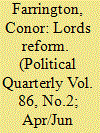

|
|
|
|
|
| Summary/Abstract |
The failure of the Coalition government's attempt to reform the House of Lords has by no means taken further reform off the political agenda. The commitment to installing an elected upper chamber is still widely shared across the political spectrum, on the basis of perceptions that the House of Lords lacks democratic legitimacy. Against this view, this article considers recent literature upon non-electoral representation, deliberative democracy and bicameralism, which together highlight the possibility of an unelected second chamber playing a legitimate role within a wider (democratic) system of government. The article then considers the House of Lords from this perspective, reflecting on changes in the upper chamber since the 1999 reforms and evaluating its role within the wider political system. The paper concludes by suggesting that political debate should focus upon small-scale reforms to ensure that the Lords becomes more effective, representative and legitimate, within the constraints of its present role.
|
|
|
|
|
|
|
|
|
|
|
|
|
|
|
|
| 10 |
ID:
138884


|
|
|
|
|
| Summary/Abstract |
This article analyses political attitudes to the union in England, Scotland and Wales after the Scottish independence referendum. Using public opinion data, we explore constitutional preferences and perceptions of national grievance, before examining the role that national identity plays in structuring preferences. Our evidence shows that considerable demand exists for nationally demarcated forms of government within the UK, although these constitutional preferences do not translate in support for policy diversity across the UK. We also find evidence that these constitutional preferences relate closely to national identity, but relate also to appeals to national interest.
|
|
|
|
|
|
|
|
|
|
|
|
|
|
|
|
| 11 |
ID:
138887
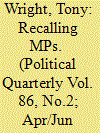

|
|
|
|
|
| Summary/Abstract |
The legislation on recall of MPs, introduced as a response to the parliamentary expenses scandal, was presented as filling an accountability gap. The nature of this alleged gap is examined, and it is argued that the accountability of Members of Parliament is more complicated than the recall proposal suggests. This includes issues about the regulation of parliamentary standards. Finally, the recall proposal is located within the context of discussion about the condition of representative democracy.
|
|
|
|
|
|
|
|
|
|
|
|
|
|
|
|
| 12 |
ID:
138879
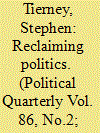

|
|
|
|
|
| Summary/Abstract |
Referendums are often criticised for being elite-controlled and undeliberative. This article argues that the detailed, multiactor regulation of the Scottish referendum resulted in an elaborate legal regime which helped to overcome these potential pathologies, diluting executive control and facilitating an exercise in national public engagement. It addresses the troubled history of referendum use in the UK and contends that the Scottish process may well transform how referendums are now viewed. Indeed, one outcome of the Scottish process is likely to be a greater demand at UK level for the use of direct democracy in processes of significant constitutional change. It is by no means certain, however, that these demands for greater popular engagement in the process of constitutional change will be met, particularly when we consider the Smith Commission process, which marks a return to elite interparty bargaining.
|
|
|
|
|
|
|
|
|
|
|
|
|
|
|
|
| 13 |
ID:
138886
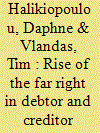

|
|
|
|
|
| Summary/Abstract |
While the 2014 European Parliament elections were marked by the rise of parties on the far right-wing, the different patterns of support that we observe across Europe and across time are not directly related to the economic crisis. Indeed, economic hardship seems neither sufficient nor necessary for the rise of such parties to occur. Using the cross-national results for the 2004, 2009 and 2014 EP elections in order to capture time and country variations, we posit that the economy affects the rise of far right-wing parties in more complex ways. Specifically, we compare the experience of high-debt countries (the ‘debtors’) and the others (the ‘creditors’) and explore the relationship between far right-wing party success on the one hand, and unemployment, inequality, immigration, globalisation and the welfare state on the other. Our discussion suggests there might be a trade-off between budgetary stability and far right-wing party support, but the choice between Charybdis and Scylla may be avoided if policy-makers carefully choose which policies should bear the brunt of the fiscal adjustment.
|
|
|
|
|
|
|
|
|
|
|
|
|
|
|
|
| 14 |
ID:
138878
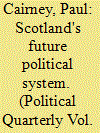

|
|
|
|
|
| Summary/Abstract |
Debates on Scottish constitutional reform go hand in hand with discussions of political reform. Its reformers use the image of ‘old Westminster’ to describe ‘control freakery’ within government and an adversarial political system. Many thought that the Scottish political system could diverge from the UK, to strengthen the parliamentary system, introduce consensus politics and further Scotland's alleged social and democratic tradition. Yet the experience of devolution suggests that Holyrood and Westminster politics share key features. Both systems are driven by government, making policy in ‘communities’ involving interest groups and governing bodies, with parliaments performing a limited role and public participation limited largely to elections. The Scottish government's style of policy-making is distinctive, but new reforms are in their infancy and their effects have not been examined in depth. In this context, the article identifies Scotland's ability to make and implement policy in a new way, based on its current trajectory rather than the hopes of reformers.
|
|
|
|
|
|
|
|
|
|
|
|
|
|
|
|
| 15 |
ID:
138874


|
|
|
|
|
| Summary/Abstract |
THE SCOTTISH independence referendum was held on 18 September 2014. From a voter turnout of 85 per cent, 55 per cent voted No to the question ‘Should Scotland be an independent country?’ The result provided something for both sides. For one, a 55 per cent
No vote can be portrayed as a decisive outcome that settles the matter for a generation. For the other, a 45 per cent Yes vote provides hope. In the short term, the hope was that the Smith Commission, formed to produce proposals for further devolution, would recommend a eaningful level of constitutional change. In the long term, it may be that the failure to deliver an adequate devolution ‘settlement’ produces enough of an appetite for a second, this time successful, referendum.
|
|
|
|
|
|
|
|
|
|
|
|
|
|
|
|
| 16 |
ID:
138882
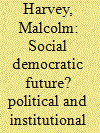

|
|
|
|
|
| Summary/Abstract |
The Nordic model has long been admired in Scotland, and has featured prominently in aspects of the Scottish independence referendum debate. This article explores the difficulties in instituting a similar system here, identifying two significant barriers: the institutional setting (the powers available to Scottish politicians) and the partisan nature of competition between the two parties that might be able to deliver upon such a commitment. It concludes that the prospects of moving towards a Nordic-style social investment model are slight, given the political, institutional and attitudinal barriers in place.
|
|
|
|
|
|
|
|
|
|
|
|
|
|
|
|
| 17 |
ID:
138877
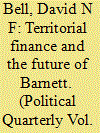

|
|
|
|
|
| Summary/Abstract |
This article traces the changing funding relationships between Scotland and the UK government. Beginning from the Barnett Formula, it examines how the changing support within Scotland for greater political autonomy from Westminster has influenced the mechanisms that have determined Scotland's fiscal structure. Increasing support for the SNP, and then for the Yes campaign in the September 2014 independence referendum, has led to a mixture of new powers being granted to the Scottish Parliament. The Scotland Act 2012 extends the Scottish government's control over income tax and some other small taxes. Although independence was rejected by the Scottish people in September 2014, the ‘Vow’ made by the Westminster parties immediately before the vote is leading to far-reaching changes in the UK's fiscal structure. This will cause a very substantial change in intergovernmental relations within the UK, which the Barnett Formula may not survive.
|
|
|
|
|
|
|
|
|
|
|
|
|
|
|
|
|
|
|
|
|